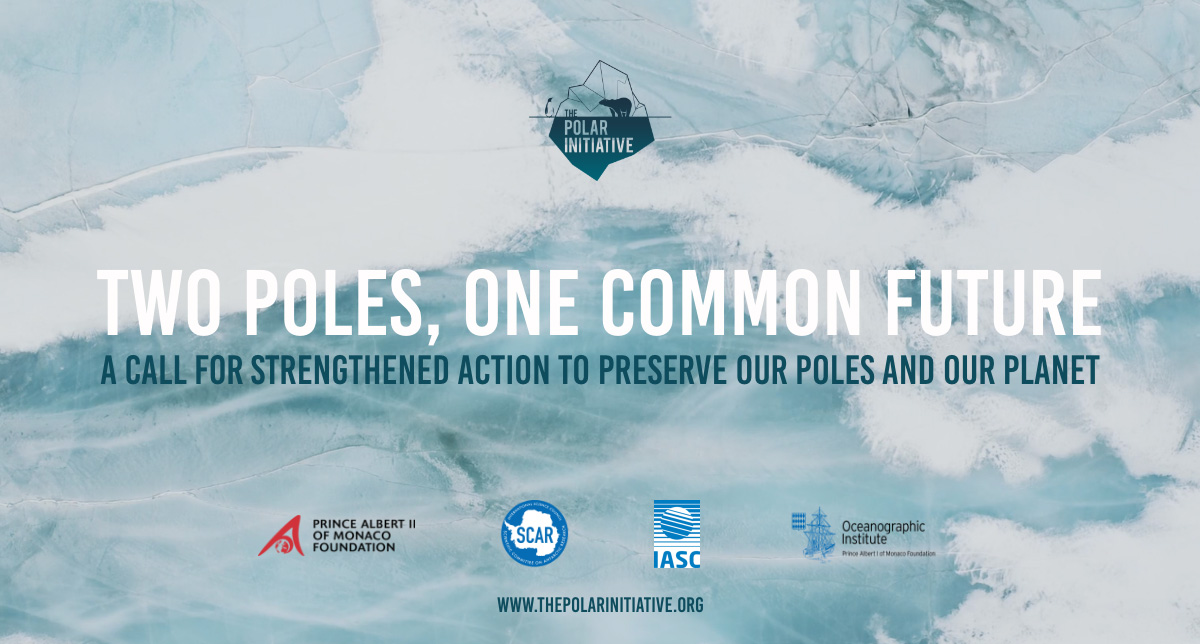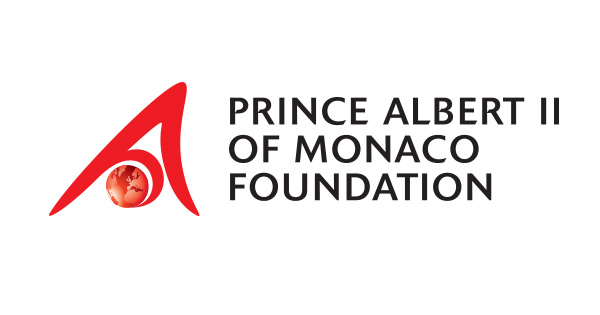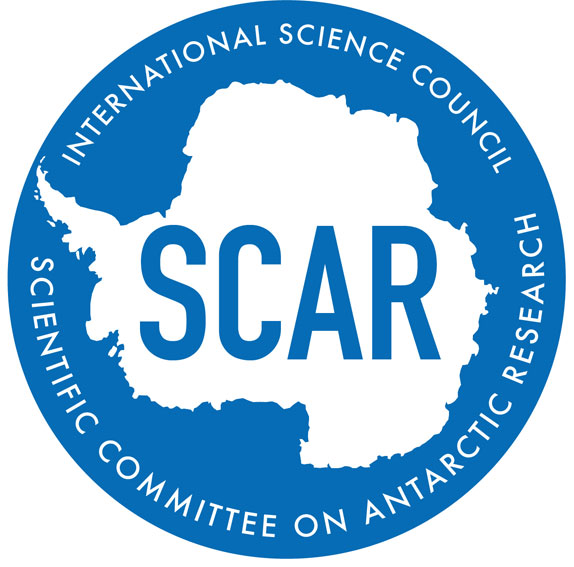In the framework of its Polar Initiative, the Prince Albert II of Monaco Foundation co–organised its first scientific symposium on polar change “The Cold is Getting Hot! Polar Symposium: from the Arctic to Antarctic” on the 24th and 25th February 2022 in partnership with the Scientific Committee on Antarctic Research (SCAR), the International Arctic Science Committee (IASC), and the Oceanographic Institute of Monaco, Prince Albert I of Monaco foundation. More than a hundred leading scientists convened at the Oceanographic Museum in Monaco to discuss polar changes, impacts on people andtheeconomy, governance and solutions.

The significance of the frozen world for the global climate and human socioeconomic development is undeniable. But environmental changes in the Arctic and the Antarctic are accelerating, affecting local species and ecosystems, and impacting the broader climate and ecological systems far beyond the polar regions.
The event “Polar Oceans: engine to the global ocean” organized on June 28 in the frame of the UN Ocean Conference in Lisbon (June 27 -July 1, 2022) will be sharing the scientific conclusions of this symposium. HSH Prince Albert II of Monaco, polar scientists and advocates will gather to raise attention to the role of the Southern and Arctic Oceans in driving ocean and climate change.
- Poles are warming two to three times quicker than the rest of the world.
- Ice in the Arctic is being lost at a pace of 13% per decade. An ice-free summer ArcticOceancould be seen possibly as early as 2030.
- The Thwaites glacier, a critical hot spot in the Antarctic, is rapidly retreating. This may be a tipping point – a point beyond which effects are amplified and change irreversibly.
- The Southern Ocean absorbs 50% of annual global CO2emissions – a huge climatic favor, but this capacity is slowing down as more CO2is absorbed.
- 20.2% of the Arctic’s terrestrial area and 4.7% of the Arctic’s marine areas are protected (2016 data). Two MPAs have been established within the CCAMLR area: one on the South Orkney Islands’ southern shelf (in 2009) and one in the Ross Sea region (in 2016). There are discussions to increase Protected Areas in the Arctic and nominate 3 critical MPAs in the Antarctic.
- 35 cm of sea level rise by 2050 is already locked in, even if CO2 emissions are brought to zero today.
- The natural emissions of greenhouse gas from thawing of tundra is increasing and could become a substantial contributor to the global carbon balance [the ‘country of permafrost‘].
- Addressing climate change as a matter of urgency
Rapidly reducing carbon dioxide and other greenhouse gas emissions and keeping warming well below 2° C as per the Paris Agreement remains paramount, thus preventing the worst effects in the poles and the catalytic effects throughout the world in terms of sea level rise, disruption of ocean and atmospheric currents, and increased warming. Every tenth of a degree matters. - Critically increasing investment in polar research
This means a) accelerating the pace of science, focusing on resolving the greatest uncertainties, providing access and resources for better infrastructure and encouraging cross-sector collaboration science-society-industry; b) mobilizing greater collaborative initiatives, building on success stories and lessons learned from previous and ongoing flagship projects such as MOSAIC, EPICA and the International Thwaites Glacier Collaboration; and c) ensuring it be inclusive, interdisciplinary, integrated, and co-produced. Indigenous peoples and traditional knowledge have a crucial part to play. And polar early career scientists must be better supported and stimulated to participate in co-designing, implementing and sharing research work. Science and knowledge underpin the sustaining of resilient economies and communities, particularly in the face of change. There is a critical need to develop integrated interdisciplinary observing systems in the polar oceans, improve projections of global warming and better prepare for inevitable changes. Urgent research also needs to prioritize a better understanding of ocean-ice interactions in cavities and ocean heat absorption. - Minimizing other pressures and providing space and time necessary to discover and protect polar life before it is lost and strengthening resilience in the face of accelerating climate changeManagement actions need to be precautionary and responsive to new discoveries and new data, so that actions can be adjusted according to the information available. Creating marine protected areas, in the right places supported by adequate monitoring and enforcement,is a proven management response that will protect polar ecosystems. Removing pollution threats, minimizing species invasions, and promoting sustainable fishing are other appropriate options. Importantly, no solutions will work if they are not fair and equitable, respecting the rights and knowledge of indigenous peoples and local communities in the north.
- The Arctic and Antarctic science communities working together
Though issues and contexts are different, there remain many common themes that would benefit from greater sharing and joint work, all the more as the polar regions are the most difficult and remote places in the world for sustained data collection, thereby most expensive to finance. As new technology using satellites, robotics and artificial intelligence will be needed,cost sharing and mutual use would be advantageous. Ocean-climate issues or sea-ice interactions across the two poles call for joint research effort. Economic opportunities arising in both poles would best be accompanied by common capacity building and monitoring protocols. These require significant investment, international collaboration, and innovative partnerships, and greater opportunities must be made available to coordinate Arctic and Antarctic scientific efforts for the sake of efficiency and effectiveness as well as for joint assessment and projections. - Giving polar issues a voice, thanks to influential sherpas
The scientific community needs efficient channels and outreach to present and alert stakeholders. Scientists hold the messages, but they need to make them heard far beyond polar regions. Leaders and messengers are urged to continue to give a voice to science and forcefully bring findings and knowledge to wider audiences, sharing stories and emotions as much as facts: mainstreaming polar issues in international conferences focusing on ocean or climate as well as concerning low-lying islands or desert countries; mobilizing other media, advocates and influencers together with scientists to make visible the roles of the polar regions and the way they are changing.
The polar regions as we knew them are not the same today and will not be the same tomorrow. Some of the future change is inevitable, locked in by past and current emissions, but we retain the possibility to halt some of the adverse impacts, adapt to the change and preserve key functions of the ecosystems, even if the window to act is quickly closing. The most recent, indisputable scientific evidence not only defines the state of the environment and possible future courses, but also provides a roadmap of causation that underpins discerning the actions needed to start reversing the effects of decades of greenhouse gas emissions. Alongside HSH Prince Albert II of Monaco, whose long-lasting leadership on polar issues is internationally recognised, the partners of the Polar Initiative and the participants of the Symposium call for a greater protection of Arctic and Antarctic regions and for shedding a continuous light on the benefit they represent for the Planet and Humanity.
Partners of the Polar Initiative:
 Since 2006, the Prince Albert II of Monaco Foundation (PA2F) has been working to protect the environment and promote sustainable development. Active at an international level, the Foundation focuses its actions on three main areas: limiting the effects of climate change and promoting renewable energies, preserving biodiversity, managing water resources and combating desertification. The Foundation works in three main geographical areas: the Mediterranean Basin, the Polar Regions and the Least Developed Countries. In 15 years, the PA2F has supported more than 700 projects, for almost 90 million euros.
Since 2006, the Prince Albert II of Monaco Foundation (PA2F) has been working to protect the environment and promote sustainable development. Active at an international level, the Foundation focuses its actions on three main areas: limiting the effects of climate change and promoting renewable energies, preserving biodiversity, managing water resources and combating desertification. The Foundation works in three main geographical areas: the Mediterranean Basin, the Polar Regions and the Least Developed Countries. In 15 years, the PA2F has supported more than 700 projects, for almost 90 million euros.
 The International Arctic Science Committee (IASC) is a non-governmental, international scientific organization that encourages and facilitates cooperation in all aspects of Arctic research, in all countries engaged in Arctic research and in all areas of the Arctic region. Overall, IASC promotes and supports leading-edge interdisciplinary research in order to foster a greater scientific understanding of the Arctic region and its role in the Earth system. Currently, 24 countries are represented.
The International Arctic Science Committee (IASC) is a non-governmental, international scientific organization that encourages and facilitates cooperation in all aspects of Arctic research, in all countries engaged in Arctic research and in all areas of the Arctic region. Overall, IASC promotes and supports leading-edge interdisciplinary research in order to foster a greater scientific understanding of the Arctic region and its role in the Earth system. Currently, 24 countries are represented.
 The Scientific Committee on Antarctic Research (SCAR) is responsible for establishing, through scientific research and international cooperation, a broad understanding of the nature of Antarctica, the role of Antarctica in the Earth system and the effects of global change on Antarctica. The first SCAR meeting was held in The Hague from 3 to 6 February 1958. SCAR also provides objective and independent scientific advice to the Antarctic Treaty Consultative Meetings (ATCMs) and other organizations such as the IPCC.
The Scientific Committee on Antarctic Research (SCAR) is responsible for establishing, through scientific research and international cooperation, a broad understanding of the nature of Antarctica, the role of Antarctica in the Earth system and the effects of global change on Antarctica. The first SCAR meeting was held in The Hague from 3 to 6 February 1958. SCAR also provides objective and independent scientific advice to the Antarctic Treaty Consultative Meetings (ATCMs) and other organizations such as the IPCC.
In collaboration with:
The Oceanographic Institute, Prince Albert I of Monaco Foundation was founded by Prince Albert I, a passionate and visionary seafarer. Recognised as serving the public interest by French presidential decree on 16 May 1906, the Foundation has been working for the Ocean for more than a century. To promote the knowledge, love and protection of the Ocean, it brings together people from the world of politics, science, economics and associations and the general public. Managed by a Board of Directors assisted by a Scientific Council, it carries out its mission of environmental outreach via its two facilities, its international influence and the support of its partners.
Press contacts:
Nadège Massé
Director of Communications
Prince Albert II of Monaco Foundation
nmasse@fpa2.org
Johanna Grabow
Communications and Information Officer
Scientific Committee on Antarctic Research
johanna@scar.org
Federica Scarpa
Communication Manager
International Arctic Science Committee
federica.scarpa@iasc.info
